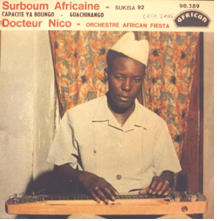|
 Docteur Nico (Kasanda wa Mikalayi, Nicolas), virtuoso Congolese guitarist; born Mikalayi, Congo-Kinshasa, July 7, 1939; died Brussels, Sept. 22, 1985. Docteur Nico (Kasanda wa Mikalayi, Nicolas), virtuoso Congolese guitarist; born Mikalayi, Congo-Kinshasa, July 7, 1939; died Brussels, Sept. 22, 1985.
Nico embarked on a musical career in his early teens as a backup singer at Opika, one of Léopoldville's (Kinshasa) earliest recording studios. He learned guitar from his older brother, Charles "Dechaud" Mwamba, then quickly advanced to become the better player. "Para-Fifi" (1952), Nico's first record as featured guitarist, found him backing singer Joseph Kabasele. Kabasele, Nico, and Dechaud went on to form the nucleus of African Jazz, a seminal band that evolved between 1953 and 1955 from the pool of Opika session players.
Like most Congolese guitarists, Nico abandoned his acoustic instrument in favor of a new electric model in the mid-fifties. His penchant for experimentation and innovation led to a style he called "merengue," where each note shimmered into the next as on "Merengue Scoubidou." For the most part, however, he played the conventional Congolese rumba in subtle patterns of single notes on top of Dechaud's rhythm guitar accompaniment.
The year 1960 took Nico to Brussels as part of a revamped African Jazz that went to play for Congolese delegates to the round table conference on Congo's independence from Belgium. Band recorded several sides in Brussels including the Africa-wide hit "Indépendance Cha Cha." Nico recalled that a Belgian radio announcer called him a doctor of his craft, thus conferring his famous nickname (Docteur, in French).
Three years later the entire band deserted Kabasele and re-named itself African Fiesta. During this period Nico introduced Hawaiian steel guitar to the music, using it to good effect on "N'daya Paradis." Another of Nico's shimmering merengues, "Merengue President," also became a hit. Nico shared leadership of the group with singers Roger Izeidi and Tabu Ley Rochereau until the end of 1965 when the band split again. Izeidi and Rochereau led one faction, which eventually became Afrisa. Nico led the other faction, which he named African Fiesta Sukisa.
As leader of Fiesta Sukisa, Nico entered perhaps his most creative period, writing much of the band's material and otherwise shaping it in his own image. He mainly stayed faithful to the rumba while nudging it in new directions. His Hawaiian steel guitar emboldens "Limbisa Ngai" (forgive me), a song by flutist Michel Ngwalali. "Ozali Sika ya Mobali" (you are the ideal of a man) features Nico's tasteful vamping behind the singers and his elegant turn through the sebene, Congolese music's instrumental passage.
The quality of Nico's leadership fell short of his musical skills. His dictatorial methods triggered defections and the band's eventual demise in 1973. Nico was also beset by personal problems, his wife's infidelity and a mounting reliance on alcohol. Several comeback attempts failed until 1980 when Nico joined Afrisa for a stint with former colleague Tabu Ley. Some solo recording followed which led to an alliance with producer Gérard Akueson, manager of Congolese singer Abeti. Recordings under Akueson's direction, with backing from Abeti's band Les Redoutables, seemed to signal Nico's resurrection. But failing health—a blood disorder it was said—brought his life to an untimely end.
At his peak, Docteur Nico was a brilliant guitarist who inspired a generation of musicians across the African continent. Brothers Nico and Dechaud set the standard for Congolese-style lead and rhythm guitar interplay. While both are now dead, re-issues of their recordings continue to influence musicians across the African continent.
© 2011 Gary Stewart
SELECT DISCOGRAPHY
With African Jazz: Merveilles du Passé (Sonodisc CD36503) sixties recordings reissued 1991; Succès des Annees 50/60 (Sonodisc CD36579) reissued 1997.
With African Fiesta: Nico, Rochereau, Roger (Sonodisc CD36509) sixties recordings reissued 1992; N'daya Paradis (Sonodisc CD36580) sixties recordings reissued 1997.
With African Fiesta Sukisa: Eternal Docteur Nico (Sonodisc CD36516) sixties recordings reissued 1992; Nico et l'African Fiesta Sukisa (Sonodisc CD36524) sixties recordings reissued 1992.
SELECT BIBLIOGRAPHY
M. Lonoh, Essai de commentaire sur la musique congolaise moderne, (Kinshasa, 1969); S. Bemba, 50 ans de musique du Congo-Zaire (Paris, 1984); G. Stewart, Breakout: Profiles in African Rhythm (Chicago, 1992); G. Stewart, Rumba on the River (London and New York, 2000).
Watch rare footage of Docteur Nico performing with Tabu Ley: http://www.youtube.com/watch?v=pxF7tLP3lME
|

